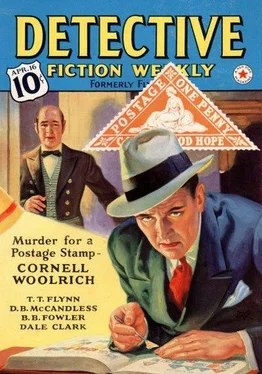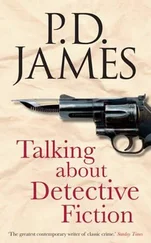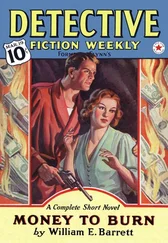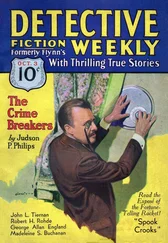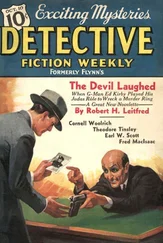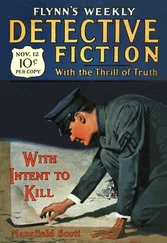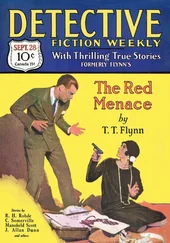Лоуренс Трит - Detective Fiction Weekly. Vol. 118, No. 6, April 16, 1938
Здесь есть возможность читать онлайн «Лоуренс Трит - Detective Fiction Weekly. Vol. 118, No. 6, April 16, 1938» весь текст электронной книги совершенно бесплатно (целиком полную версию без сокращений). В некоторых случаях можно слушать аудио, скачать через торрент в формате fb2 и присутствует краткое содержание. Город: New York, Год выпуска: 1938, Издательство: The Red Star News Company, Жанр: Детектив, на английском языке. Описание произведения, (предисловие) а так же отзывы посетителей доступны на портале библиотеки ЛибКат.
- Название:Detective Fiction Weekly. Vol. 118, No. 6, April 16, 1938
- Автор:
- Издательство:The Red Star News Company
- Жанр:
- Год:1938
- Город:New York
- ISBN:нет данных
- Рейтинг книги:3 / 5. Голосов: 1
-
Избранное:Добавить в избранное
- Отзывы:
-
Ваша оценка:
- 60
- 1
- 2
- 3
- 4
- 5
Detective Fiction Weekly. Vol. 118, No. 6, April 16, 1938: краткое содержание, описание и аннотация
Предлагаем к чтению аннотацию, описание, краткое содержание или предисловие (зависит от того, что написал сам автор книги «Detective Fiction Weekly. Vol. 118, No. 6, April 16, 1938»). Если вы не нашли необходимую информацию о книге — напишите в комментариях, мы постараемся отыскать её.
Detective Fiction Weekly. Vol. 118, No. 6, April 16, 1938 — читать онлайн бесплатно полную книгу (весь текст) целиком
Ниже представлен текст книги, разбитый по страницам. Система сохранения места последней прочитанной страницы, позволяет с удобством читать онлайн бесплатно книгу «Detective Fiction Weekly. Vol. 118, No. 6, April 16, 1938», без необходимости каждый раз заново искать на чём Вы остановились. Поставьте закладку, и сможете в любой момент перейти на страницу, на которой закончили чтение.
Интервал:
Закладка:
“It’s a frameup!” snapped Lamport.
“Sure it is.”
Flannagan studied the effect of his words. They produced not outraged morality nor even a sense of being duped, but admiration and a cool, calculating appraisal of how best to handle the situation.
Flannagan said quietly, “I think we understand each other.”
“I’ll have to think it over.” Lamport pressed a switch and spoke into the dictaphone connecting with the receptionist in his outer office. “Will you call Durcher? I’ll be wanting him later on.” Lamport left the switch connected so that the remainder of the conversation could be heard outside.
“What are you after?” demanded Lamport angrily. “Money?”
“Oh no. Something far more elemental. Justice.”
“What’s that!”
“I’ll try to explain, though you could best start with a dictionary. Then, if it’s still beyond you, I could submit a bibliography. Some very great minds have examined the subject.”
“As I understand it, Flannagan, you’re deliberately framing me with false testimony. You’re claiming that a gun which I left in New York was actually in Smyrna.”
“Oh no. I’m claiming that your gun was in Smyrna because I can prove it.”
“And just what do you want out of this?”
Flannagan did something rare with him. He repeated himself. “Justice,” he said. “When I was in Smyrna, I found a case against Seely that looked practically airtight, except for one little thing. But the alternative was too fantastic, assumed too fast and facile and fertile a brain behind it, so I kept the idea to myself. When I brought my evidence to the laboratory my hunch was confirmed, but confirmed with a delicate piece of scientific analysis that nobody would believe. Certainly not a Smyrna jury. I needed you to help me, and you did.” Flannagan heard a door slam in the outer office. The rumble of voices sounded vaguely. He stood up.
“And so,” he said, “I found that the marks on the cartridge case prove the gun is yours.”
“You lie!” thundered Lamport. “I never even took my gun with me.”
“Difficult to prove.”
Lamport cleared his throat and spoke in a loud voice. “So your proposition is that if I pay you enough you won’t frame me on the Seely case.”
Flannagan, in an equally loud tone, replied, “My proposition is this: I want you to do just one thing.” He moved casually toward the side door. “To go to hell!”
He yanked open the door and dived. Lamport yelled, “Get him — cover the back!”
Flannagan dashed to the left, saw a door marked, “Lewin Office Supply,” and opened it. A girl was sitting in front of a typewriter. She had dark hair and brown eyes and a long delicate face. Flanagan peeled off his coat, pulled a gun and barked. “Don’t get scared and you’ll be all right. I’m in a jam — cops’ll be here — take this letter down on your machine — and so help me, if you give me away—”
His mouth tightened and his eyes shot fire. Then he hopped on one corner of her desk, gun still drawn but concealed by his body so that he was half sitting on it.
Her face went chalk white and she stared with her large, appealing eyes. Flannagan — smiled. “Steady,” he said. “Now take this: ‘According to our records the goods were delivered on the 14th of the month and—’ ”
The typewriter was dirking steadily. Flannagan jerked his head around as two cops punched open the door and strode in.
“What do you want?” demanded Flannagan.
They hesitated. One said:
“A little guy, your build — seen him anywhere?”
“Not in the last fifteen minutes. I’ve been dictating. What happened?”
The cop glared. “How the hell do I know? Maybe nothing. But if he shows up, yell.”
“Yell my head off.” grinned Flannagan. “Hope you find him, officer.”
The door slammed shut. Flannagan drew a deep breath. The girl said. “It was too fast for me and I didn’t have time to think. I don’t believe you’d shoot me. I’m going to scream.”
“Of course I wouldn’t shoot you, and you won’t scream either. At least not until you know what it’s all about. Let’s go downstairs and have a soda. I’ll tell you how I was framed, and if you think the cops ought to have me, then you can scream your head off. Want my gun for a guarantee of good faith?”
He held her with his eves with their clear steady blueness, with their frank liking for her and with the vague dreamy humorous quality in them.
She said, “Yes, I’ll take your gun.” Flannagan held it by the barrel and waved it casually. “It’s a wild excitable crazy kind of world, isn’t it? You’re a stenographer in a — what kind of an office is this?”
“Office supply. Weren’t you going to give me the gun?”
“Yes. Fascinating work. Fascinating despite the drudgery, because any minute of any day somebody can walk through that door and change the entire course of your life. Two minutes ago you could have opened your mouth and ruined me. You can still do it. A half hour ago I kept a routine appointment and a man framed me. The police wouldn’t hold me a half hour, but my name would come out and a very worthy enterprise be damaged with the laughter heaped upon it.” He calmly pocketed his revolver. “I wish I could do something to thank you for using your head.”
“You could tell me exactly what this is all about and see if I believe it.”
He looked thoughtful as he put on his coat. “My name is Flannagan. Paul Flannagan. And yours?”
“Elizabeth Dean.”
“May I use your phone, Miss Dean?”
He dialed Lamport’s number. Into the mouthpiece he said, “This is Flannagan speaking. I’m in a phone booth around the corner and thought I’d tell you to call off the police hunt. A waste of time, now. I knew what you were doing as soon as you told your receptionist to call Lieutenant Durcher. An unusual name, Durcher, and I happen to know him. I doubt whether he’d have arrested me under any circumstances, but the story would have reached the papers and made me a laughing stock. My attempt to compel you to withhold testimony. My reputation’s a vulnerable point, in view of my work. You tried a neat trick but it was obvious that you didn’t switch off your outer office communication. The only obvious thing you’ve done thus far. And thanks for an interesting afternoon. You enabled me to meet an extremely attractive young lady, and that doesn’t happen every day.”
He hung up. “I think I can go in safety now, Miss Dean. As for the explanation I was going to give you — suppose we postpone it till dinner this evening. Say the lobby of the Astor, about seven o’clock. Will that suit you?”
It did, but the meeting between Paul Flannagan and Elizabeth Dean is no part of this story, except that as a result she changed her job from the Lewin Office Supply to the publicity office of the Academy of Police Science.
About a week before Seely was due to stand trial in Smyrna for assault with intent to kill, Lamport came to see him by appointment. It was the first time the two men had spoken at any length since the shooting. Seely, embarrassed, older and more haggard than when Lamport had last seen him, offered cigars and a highball before he came to the point of the interview.
“I’ve been thinking about this, Warren. You claim I shot you. I can’t find it in me to doubt your word, even though I have no recollection, no consciousness of the act. They say that men can do things automatical, without volition or realization of the nature of what they’re doing. Maybe. If it’s possible, maybe that’s what I did. A kind of temporary insanity. That’s the plea Tannick advises me to make.”
“I’d like to think that was the reason, Bart. Even so, it’s tough on me.”
Читать дальшеИнтервал:
Закладка:
Похожие книги на «Detective Fiction Weekly. Vol. 118, No. 6, April 16, 1938»
Представляем Вашему вниманию похожие книги на «Detective Fiction Weekly. Vol. 118, No. 6, April 16, 1938» списком для выбора. Мы отобрали схожую по названию и смыслу литературу в надежде предоставить читателям больше вариантов отыскать новые, интересные, ещё непрочитанные произведения.
Обсуждение, отзывы о книге «Detective Fiction Weekly. Vol. 118, No. 6, April 16, 1938» и просто собственные мнения читателей. Оставьте ваши комментарии, напишите, что Вы думаете о произведении, его смысле или главных героях. Укажите что конкретно понравилось, а что нет, и почему Вы так считаете.
